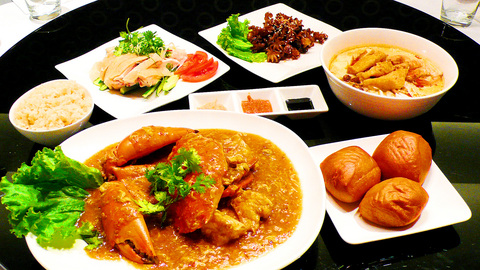Prima Taste (百勝廚)
Address: 112 Changan E Rd Sec 2, Taipei

PHOTO: HO YI, TAIPEI TIMES
(台北市長安東路二段112號)
Telephone: (02) 2506-6118
Open: Sunday to Thursday from 11:30am to 3pm and 5:30pm to 10pm; Friday and Saturday from 11:30am to 3pm and 5:30pm to 11pm
Average meal: NT$300 for lunch; NT$450 for dinner
Details: Menu in Chinese and English; credit cards accepted
Having sprung up in Indonesia, Philippines, China, Canada and the US since 2000, Singapore's restaurant chain Prima Taste arrived in Taipei three months ago, offering a real taste of Singaporean cuisine.
"Since Singapore is a multiethnic society made up of Chinese, Malays, Indians and Eurasians, its food is a fusion," said operation manger David Huang (黃富承).
The island nation's world-famous Hainanese chicken is the offspring of such multicultural mingling. A marriage of a Hainan Island dish with local herbs such as the popular pandan leaves, the chicken is steamed in a special cooking machine developed by the food enterprise that cuts the preparation time from a few hours to 40 minutes while retaining the full flavor of the dish. The broth from this cooking process is used to cook the rice.
The chicken platter (NT$400) offers Hainanese chicken, crispy fried and soya chicken for customers who want to try all permutations of this classic dish.
Other iconic dish include pork rib tea soup (肉骨茶, NT$280), sparerib simmered with various Chinese medicines and spices and laksa, a bowl of rice noodles in a broth made of coconut milk, clam, fish cake, shrimp and fried bean curd (油豆腐), a typical Singaporean dish combining Chinese and Malay influences.
Claiming pride of place as the country's national dish, Singapore chili crab (NT$550) cooked with chili paste and tomato, ginger, chili and other spices, is guaranteed to enliven the taste buds.
Other specialties include rojak (NT$200), the sour-sweet fruit salad mixed with vegetables, peanuts, deep-fried dough (油條), fried bean curd and shrimp past. Otak (NT$200) is another popular appetizer. This dish is made from seafood paste seasoned with chili and coconut milk, then wrapped up in banana leaves before being grilled.
Prima Taste is planning to sell easy-to-cook packaged food in local department stores, and variety in its menu is ensured by the addition of new dishes every few months. And when you are there, remember to try out the iced barley water, the perfect accompaniment to the savory food.

Wooden houses wedged between concrete, crumbling brick facades with roofs gaping to the sky, and tiled art deco buildings down narrow alleyways: Taichung Central District’s (中區) aging architecture reveals both the allure and reality of the old downtown. From Indigenous settlement to capital under Qing Dynasty rule through to Japanese colonization, Taichung’s Central District holds a long and layered history. The bygone beauty of its streets once earned it the nickname “Little Kyoto.” Since the late eighties, however, the shifting of economic and government centers westward signaled a gradual decline in the area’s evolving fortunes. With the regeneration of the once

Even by the standards of Ukraine’s International Legion, which comprises volunteers from over 55 countries, Han has an unusual backstory. Born in Taichung, he grew up in Costa Rica — then one of Taiwan’s diplomatic allies — where a relative worked for the embassy. After attending an American international high school in San Jose, Costa Rica’s capital, Han — who prefers to use only his given name for OPSEC (operations security) reasons — moved to the US in his teens. He attended Penn State University before returning to Taiwan to work in the semiconductor industry in Kaohsiung, where he

In February of this year the Taipei Times reported on the visit of Lienchiang County Commissioner Wang Chung-ming (王忠銘) of the Chinese Nationalist Party (KMT) and a delegation to a lantern festival in Fuzhou’s Mawei District in Fujian Province. “Today, Mawei and Matsu jointly marked the lantern festival,” Wang was quoted as saying, adding that both sides “being of one people,” is a cause for joy. Wang was passing around a common claim of officials of the People’s Republic of China (PRC) and the PRC’s allies and supporters in Taiwan — KMT and the Taiwan People’s Party — and elsewhere: Taiwan and

On May 2, Chinese Nationalist Party (KMT) Chairman Eric Chu (朱立倫), at a meeting in support of Taipei city councilors at party headquarters, compared President William Lai (賴清德) to Hitler. Chu claimed that unlike any other democracy worldwide in history, no other leader was rooting out opposing parties like Lai and the Democratic Progressive Party (DPP). That his statements are wildly inaccurate was not the point. It was a rallying cry, not a history lesson. This was intentional to provoke the international diplomatic community into a response, which was promptly provided. Both the German and Israeli offices issued statements on Facebook